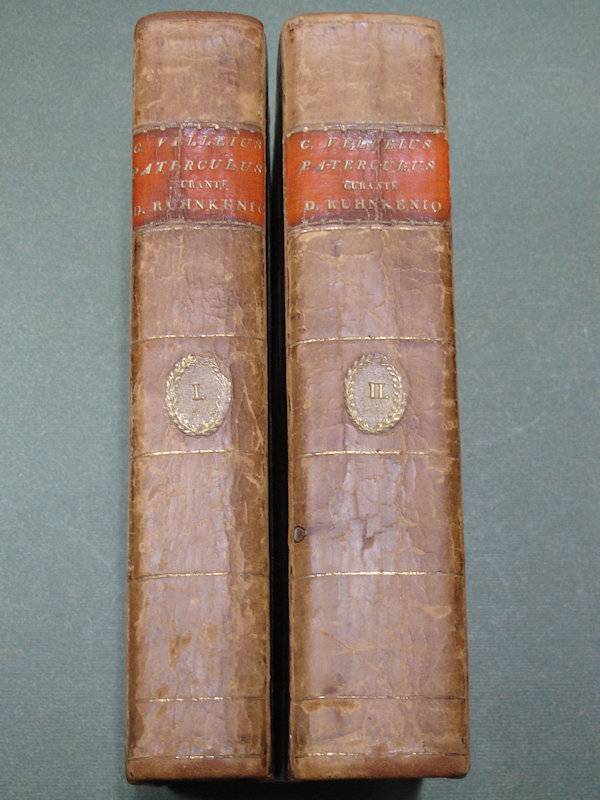VELLEIUS PATERCULUS.
C. Velleii Paterculi Quae supersunt ex Historiae Romanae voluminibus duobus, cum integris animadversionibus doctorum, curante Davide Ruhnkenio.
Leiden (Lugduni Batavorum), Apud Samuel et Joann. Luchtmans, 1779.
8vo. 2 volumes: (II, frontispiece),(XXXII),CXXII,1262 (recte 1260),(99 index),(1 blank) p. Half calf 21.5 cm (
Ref: STCN ppn 241048281; Schweiger 2,1130: a long note, from which :'Sehr wichtige Ausgabe'; 'an offenbar corrupten Stellen nahm er Emendationen, fremde und eigene, auf'. 'Die Notae des Rhenanus und Burer liess er unverstümmelt unter dem Texte abdrücken und fügte ihnen seine Anmerkungen ... neue Emendationen .. hinzu'. 'Der zweite Theil enthält den vollständigen Apparat der Burmannischen Ausgabe'; Dibdin 2, 525: 'a very excellent edition'; the text is 'amended in many passages by the judgement of Ruhnkenius, and not according to the fanciful suggestions of preceeding editors'; Brunet 4,430: 'Très bonne édition'; Ebert 23482: 'Diese Ausgabe ist ein whares Muster krit. Tacts und grammat. Gelehrsamkeit, und bis jetzt die beste'. J. Bernays, 'Geschichte der klassischen Philologie, Hildesheim, 2008, p. 144: 'jetzt (ca. 1880) noch ausgezeichnet'))(
Details: Back ruled gilt. Red shield with gilt lettering in the second compartment. Oval shield with volume number in the middle compartment. Marbled boards and edges. Frontispiece designed by H. van der My and executed by F. v. Bleyswyk, depicting Rome, personified by an emperor, as a stronghold against chaos under the protection of the Gods; in the middle stands the wise goddess Athena, who is depicted as the 'aquilifer' (Eagle-bearer) of Rome; she holds in her right hand the Palladion, and in her left hand the 'Aquila', the standard of the Roman army; with a long chain she holds the destructive forces of civil war and chaos under control) (
Condition: Backs rubbed. Binding somewhat scratched. Corners bumped. Some slight foxing) (
Note: The work of the Roman historian Velleius Paterculus, ca. 19 BC - after 30 AD, is a valuable source for the reigns of the Roman emperors Augustus and Tiberius. Paterculus, who served 'under Tiberius in many of his most important campains, seems to have conceived an unbounded admiration for him and the whole imperial family, in whose men he could see nothing but sublime virtues, while the ennemies were compact of every possible vice'. (H.J. Rose, 'A handbook of Latin literature, London, 1967, p. 355) Velleius' adulatory type of history was however condemned by the later historian Tacitus, who ignores him.
§ The 'Historiae Romanae', consists of 2 books. The beginning of the first is lost, from the founding of Rome to the battle of Pydna in 168 BC, in which the Romans defeated the Macedonian kingdom. What remains of book one ends with the fall of Carthago in 146 B.C. Book 2 is of greater importance. 'Book 2, covering the period 146 BC to AD 30, becomes more detailed as it approaches the author's own day, doubtless because, as he tells us, he projected a fuller history from the Civil War onwards'. (OCD 2nd edition p. 1111/12). His style is less polished, but we are to remember that he was more a soldier than an scholar. As we have seen in the well known works of reference, Velleius Paterculus was in good hands with the Dutch scholar of German origin David Ruhnken, or Ruhnkenius, 1723-1798. David Ruhnken was born in Pommern, and was sent by his parents in 1737 to the Friedrichscollegium in Königsberg, where he read Latin authors together with his friend Immanuel Kant. To finish his studies he went in 1744 to Leiden, to study Greek under Tiberius Hemsterhuis, whom he admired. He later told his biographer Wyttenbach that that he found in his teacher the combined gems of Leiden classical scholarship, Scaliger and Salmasius, in one person. Hemsterhuis wanted to create a worthy successor, and appointed him in 1757 to assist him as Reader in Greek. In 1761 Ruhnken succeeded the Latin chair vacated by Oudendorp. He became one of the leading scholars of his days. 'Die Führerstellung der Philologie erbte (...) von Hemsterhuys der Pommer David Ruhnken, der ganz zum Holländer ward und die vornehme und behäbige Würde eines Princeps criticorum zu wahren wusste. Als solchem hat ihm Fr.A. Wolf die Prolegomena gewidmet. (...) Musterhaftes Latein galt ihm soviel wie Wissenschaft. Aber als Lehrer muss er glänzend gewesen sein. (...) Alles was Ruhnken veröffentlicht hat, ist in seinen Grenzen tadellos'. (U. von Wilamowitz-Moellendorff, Geschichte der Philologie, Lpz./Bln. 1921, p. 39/40)
§ The edition begins with a dedication, and continues with the dedications and prefaces of previous editions, from the edition of Beatus Rhenanus of 1520 till that of Burmannus of 1719. Then follow 60 p. 'Annales Velleiani, seu vita Velleii Paterculi pro temporum ordine disposita ab H. Dodwello'. The rest of the volume is filled with the text and commentary of Ruhnkenius. Volume 2, beginning with page 500, contains the 'Variorum interpretum Notae'. (On Ruhnken: ADB 29, 615/24; and of course the dissertation of E. Hulshoff Pol, 'Studia Ruhnkeniana', Leiden 1953) (
Collation: vol. 1: pi1; +-2+8, *-7*8, 8*6 (minus blank leaf 8*6); A-2H8, 2I8 (chi1, the title of the second volume, before 2I2), 2K-4Q8; between 2F and 2G the pagination jumps from 464 to 467, the catchword connects the gatherings correctly)) (Photographs on request)
Book number: 130456 Euro 220.00
Keywords: (Oude Druk), (Rare Books), Altertum, Altertumswissenschaft, Altphilologie, Antike, Antiquity, Augustus, Dutch imprints, Latin literature, Roman history, Tiberius, Velleius Paterculus, classical philology, römische Geschichte, römische Literatur
 VELLEIUS PATERCULUS.
VELLEIUS PATERCULUS.

